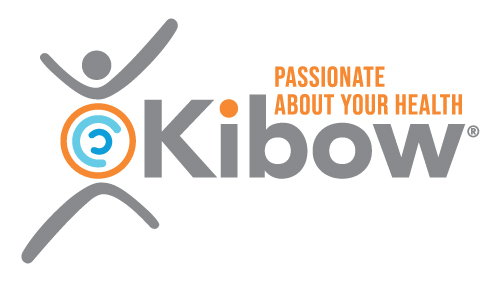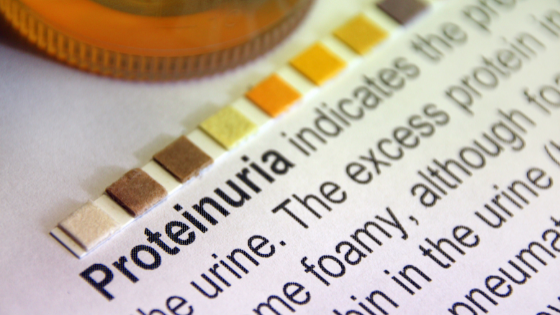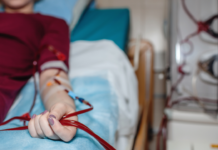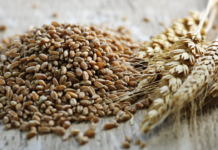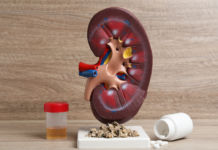*These statements have not been evaluated by the US Food and Drug Administration. This information is not intended to diagnose, treat, cure, or prevent any disease. Always consult with a qualified healthcare professional prior to beginning any diet or exercise program or taking any dietary supplement. The content on our website is for informational and educational purposes only.
Written By: Steve L. Belcher, RN, MSN, MS, DN-CM
Sponsored by: Renadyl™
Do you know that protein in your urine may be an early indication of kidney disease? What exactly is protein and why may it be an early indication of kidney disease?
What is proteinuria?
Proteinuria (pro-teen-yur-ee-uh) means protein in your urine. Your kidneys make urine by cleaning waste and extra fluid from your blood. Your kidneys also help prevent the loss of things that your body needs, like protein. Proteinuria happens when your kidneys let protein leak into your urine. Protein in your urine may also be called albuminuria or microalbuminuria.
Why does it matter if I have proteinuria?
A very tiny amount of protein in your urine may be common from time to time, but a larger amount of protein in your urine may be an early sign of kidney disease. If proteinuria is not controlled, the increased amount of protein in your urine can lead to more kidney damage. Over time, this can cause your kidneys to fail, you may need kidney dialysis. However, if you find and treat the problem that is causing your proteinuria, you may be able to stop or slow down the damage.
What are the signs of proteinuria?
Unfortunately, you are not able to see protein in your urine. The only way to know if you have proteinuria is to have your urine tested. Most people do not notice any symptoms. If you do have symptoms, they might include foamy urine or swelling in your hands, feet or face.
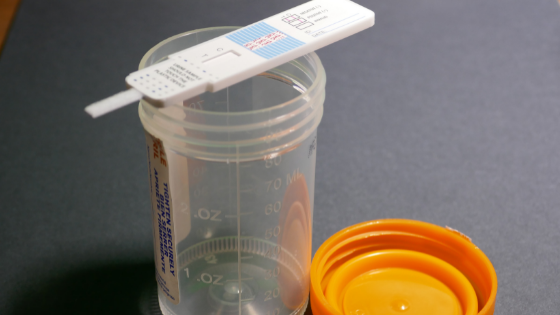
How do I know if I have proteinuria?
Being tested for proteinuria is simple. There are two main tests:
A dipstick urine test tells your doctor if there is the protein in your urine.
- Your doctor may test your urine in the office or ask you to bring in a sample from home.
- If your first dipstick urine test shows protein in your urine, ask your doctor if you should be tested again. Also ask your doctor if a Urine Albumin-to-Creatinine Ration (UACR) test is right for you.
A UACR test tells your doctor how much albumin is in your urine.
- Your doctor will test your urine for albumin (a type of protein) and creatinine (a kind of waste). Your doctor will compare these results to figure out your UACR.
- A normal UACR is less than 30 mg/g If your UACR is more than 30 mg/g, ask your doctor when you should be tested again.
What should I do if I have proteinuria?
If your tests show that you have proteinuria, work with your doctor to treat it. Remember, if the cause of your proteinuria is not treated, your kidneys may be damaged further. Treating proteinuria is one way to keep your kidneys as healthy as possible.
Ask your physician if you should:
- Have other tests to check your kidneys:
The eGFR (estimated Glomerular Filtration Rate) test or a 24-hour urine test can tell your doctor more about how your kidneys are working.
- Take medicines to help protect your kidneys
Some blood pressure medicines, like ACE inhibitors and ARBs, may help protect your kidneys. Your doctor may prescribe one of these medicines even if you don’t have high blood pressure.
- Take steps to control high blood pressure and diabetes if you have them
Limiting salt and fat in your diet and getting exercise most days of the week can help.
- See a nephrologist (Kidney Specialist)
Like always if you have any questions about getting tested for protein in your urine talk with your doctor.
About the author
Steven Belcher, RN, MSN, MS, is a dedicated kidney advocate who began his journey 20 years ago as a dialysis nurse. This job inspired him to help as many people with kidney disease as he could. Not only did he spend two decades caring for a patient’s physical and emotional needs in a clinical setting, but he also educated the public on the risk factors of kidney disease. Some of his many philanthropic successes include being a keynote speaker at the National Association of Nephrology Technicians/ Technologists (NANT), presenting at community spaces, and launching radio shows.
He now focuses his time entirely on his organization Urban Kidney Alliance, which educates the public about kidney disease. His goal? To lower rates of Chronic Kidney Disease in urban communities in Baltimore, Maryland, across the country, and globally through education and collaboration.
Steve has also written the book “HOW TO SURVIVE OUTPATIENT HEMODIALYSIS: A GUIDE FOR PATIENTS WITH KIDNEY FAILURE.” You can read the book review here.
Learn more about our sponsor Renadyl™ here https://renadyl.com
